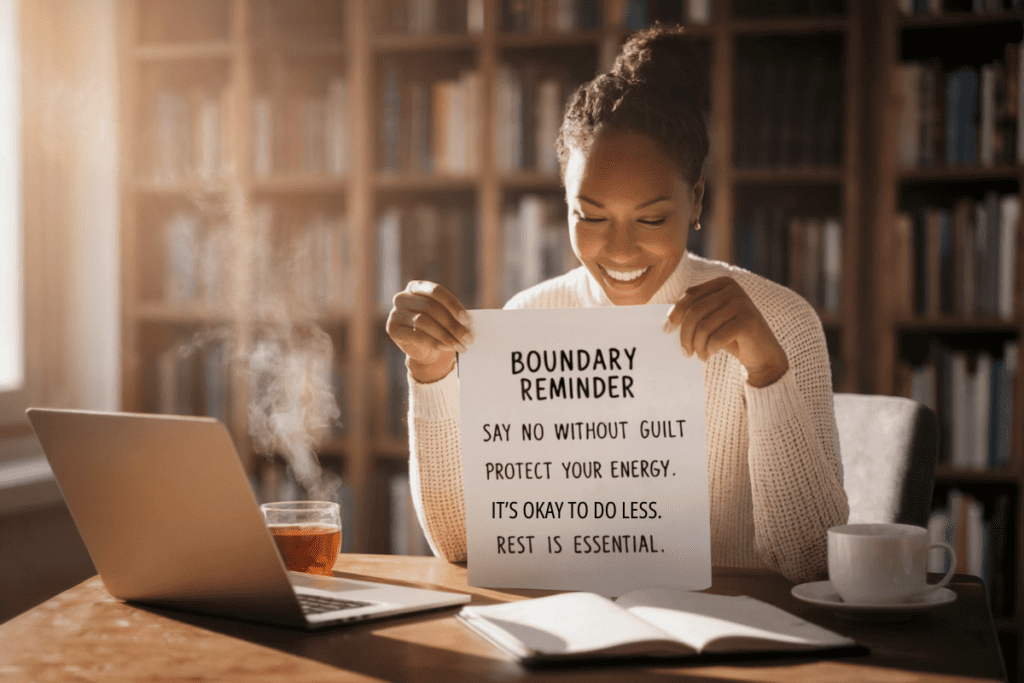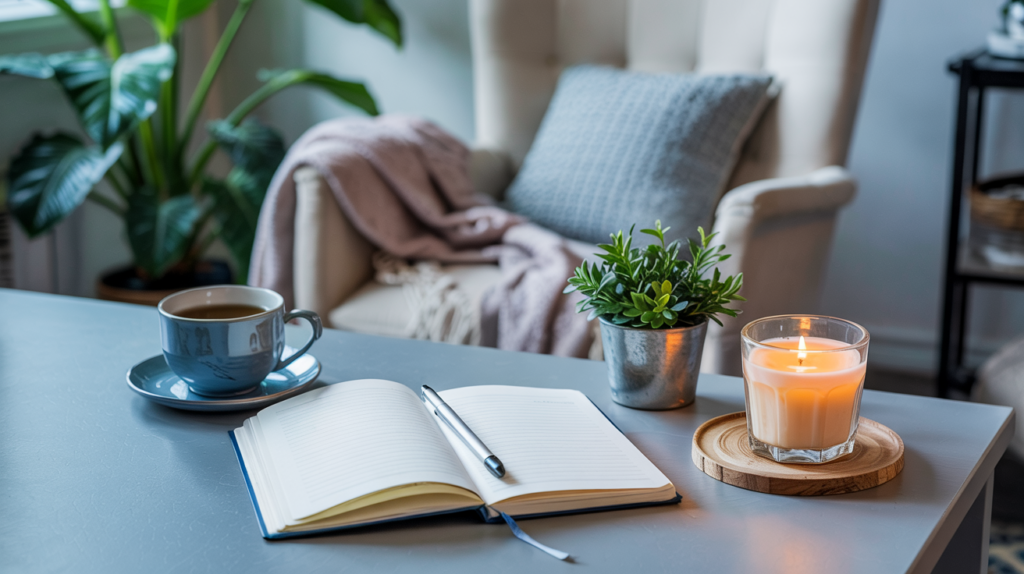Waking up with anxiety can make mornings difficult. Many people experience that uncomfortable rush of worry first thing in the morning, when stress hormones are naturally higher. Creating a structured morning routine can significantly reduce anxiety symptoms and set a calmer tone for the entire day.

Effective morning routines don’t need to be complicated. Simple habits like starting with water instead of reaching for your phone, practicing gratitude, and including gentle movement like stretching or yoga can make a tremendous difference. These practices help ground the mind and body before the day’s demands begin.
The best anxiety-reducing morning routines create space between waking and engaging with stressors. By examining thoughts mindfully and incorporating calming rituals, anyone can transform morning anxiety into morning peace. Even small changes can lead to significant improvements in how the day unfolds.
Understanding Morning Anxiety

Morning anxiety affects many people who wake up feeling worried or on edge. This experience is tied to our body’s natural hormone fluctuations and stress responses that happen when we transition from sleep to wakefulness.
The Science Behind Anxiety in the Morning
Morning anxiety is a common experience where you wake up with feelings of worry, dread, or nervousness. These feelings often occur because your brain is already anticipating stressors before you’ve even started your day.
The brain’s threat-detection system becomes more active during the transition from sleep to wakefulness. This heightened alertness can trigger anxiety, especially for those who:
- Have ongoing stress or worry
- Deal with an anxiety disorder
- Experience poor sleep quality
- Face significant life challenges
For many people, morning anxiety isn’t random but part of how the body naturally prepares for daily challenges. It can feel more intense because the mind hasn’t yet become occupied with daily tasks.
Cortisol Awakening Response and Stress Hormones
The cortisol awakening response is a natural process where cortisol levels rise significantly 30-45 minutes after waking up. This hormone surge helps prepare the body for daily activities.
In healthy individuals, cortisol typically:
- Peaks in the morning (highest around 8-9 AM)
- Gradually decreases throughout the day
- Reaches its lowest point at night
For those with chronic stress or anxiety disorders, this normal cortisol rhythm can become disrupted. Their bodies might produce too much cortisol, causing heightened anxiety symptoms first thing in the morning.
This physiological response explains why many people experience their most intense anxiety symptoms shortly after waking, even before facing any actual stressors.
The Importance of a Morning Routine

Starting your day with structured activities creates stability and sets a positive tone. Morning routines provide mental health benefits and help manage anxiety levels throughout the day.
Benefits of a Consistent Routine
A consistent morning routine offers numerous health advantages. People who follow regular routines tend to experience lower stress levels and better mental health overall.
Routines help with:
- Better time management
- Improved organization
- Enhanced productivity
- Stronger family relationships
Research shows that predictable daily patterns improve sleep quality, which directly affects mental wellbeing. Morning routines specifically help people feel more in control of their day.
Family functioning also improves with consistent morning activities. Parents and children benefit from knowing what to expect, reducing early-day conflicts and rushing.
How Routines Alleviate Anxiety
Morning routines serve as powerful anxiety management tools. The predictable, repetitive nature of routines is calming to the nervous system, helping reduce anxiety before it builds throughout the day.
A thoughtfully designed morning routine creates:
- Mental preparation time
- Space for self-care activities
- A buffer against unexpected stressors
Starting with small, manageable morning habits builds confidence. As these habits become automatic, the brain expends less energy on decision-making, reducing mental fatigue and anxiety.
Physical activities included in morning routines, such as stretching or brief exercise, release tension and promote relaxation. Even simple acts like drinking water or deep breathing help prepare for a stress-free day.
Key Elements of an Effective Morning Routine

Building a structured morning routine can significantly reduce anxiety levels and set a positive tone for the entire day. The right combination of hydration, physical activity, and mindfulness creates a powerful foundation for mental wellness.
Starting Your Day with Hydration
Drinking water first thing in the morning jumpstarts your metabolism and helps flush toxins from your system. After 7-8 hours without fluids, the body needs rehydration to function optimally.
A glass of room temperature water is ideal, as cold water can shock the system. For enhanced benefits, add a squeeze of lemon to provide vitamin C and aid digestion.
Proper hydration directly impacts mental health by reducing fatigue and brain fog that can trigger anxiety. Aim for 16 ounces (about 500ml) within the first 30 minutes of waking.
Creating a visual reminder by placing a water bottle on your nightstand ensures this healthy habit becomes automatic. Many people report feeling more alert and less irritable when properly hydrated in the morning.
Exercise as a Tool to Combat Anxiety
Morning physical activity releases endorphins that naturally combat anxiety and improve mood. Even 10-15 minutes of movement can make a significant difference.
Effective morning exercises include:
- Gentle stretching to release muscle tension
- Yoga poses that focus on breathing
- A short brisk walk in natural light
- Simple bodyweight exercises like squats or push-ups
The key is consistency rather than intensity. Regular morning exercise helps regulate cortisol levels, which often spike during anxiety.
Exercise also provides a sense of accomplishment early in the day, creating positive momentum. Moving the body mindfully helps break the cycle of anxious thoughts by shifting focus to physical sensations.
The Role of Meditation and Mindfulness
Morning meditation creates a buffer between sleep and the demands of the day. Starting with just 5 minutes of focused breathing can calm an anxious mind.
Effective mindfulness practices include:
- Body scan meditation to identify tension
- Gratitude reflection to foster positive thinking
- Guided visualization for setting daily intentions
- Breathing exercises to activate the parasympathetic nervous system
Consistency is crucial—even brief daily practice builds stronger neural pathways over time. Many people find that morning mindfulness helps them respond rather than react to stressors.
Digital tools like meditation apps provide structure for beginners. The goal isn’t to eliminate thoughts but to observe them without judgment, creating mental space between triggers and responses.
Implementing Your Anxiety-Reducing Morning Routine

Building an effective morning routine can significantly reduce anxiety levels and set a positive tone for the entire day. A thoughtfully designed routine creates stability and gives your mind a chance to ease into the day rather than jumping straight into stress.
Creating a Personalized Morning Routine
The most effective anxiety-reducing routines are tailored to individual needs and preferences. Start by identifying your specific anxiety triggers and the calming activities that work best for you.
Steps to create your routine:
- Wake up at a consistent time every day
- Allow 30-60 minutes for your routine
- Write down your routine steps
- Start with 2-3 activities and gradually add more
- Track how different activities affect your anxiety levels
Morning routines work best when they align with your natural tendencies. If you’re not a morning person, start with simple activities that don’t require much mental effort.
Some people benefit from waking up earlier, between 5:30-6:00 AM, to have extra quiet time before the day begins.
Examples of Anxiety-Reducing Activities
Incorporating specific anxiety-reducing elements into your morning can make a significant difference in your mental state throughout the day.
Physical activities:
- Light stretching or yoga (5-10 minutes)
- Short walk outside
- Deep breathing exercises (4-7-8 method)
Mental wellness activities:
- Practicing gratitude by listing three things you’re thankful for
- Writing in a journal for 5 minutes
- Meditation or mindfulness practice (even just 2-3 minutes helps)
Healthy habits:
- Drinking water first thing in the morning
- Eating a nutritious breakfast
- Avoiding phone checking for the first 30 minutes after waking
Many find it helpful to spend time outdoors, even briefly, as morning sunlight helps regulate mood and sleep cycles.
Adapting Your Routine for Lasting Benefit
A morning routine is only effective if it can be maintained consistently and adjusted as needed. Pay attention to what works and what doesn’t, and be willing to make changes.
Tips for maintaining your routine:
- Start small with 1-2 new habits before adding more
- Prepare the night before (lay out clothes, prep breakfast)
- Use visual reminders or checklists
- Be flexible when life disrupts your routine
- Reassess every few weeks and adjust as needed
If certain activities don’t reduce your anxiety, replace them with alternatives. Getting outside more often and minimizing screen time are two adjustments that benefit many people.
Teachers and others with high-stress jobs may need to start with positive thoughts to counteract work-related morning anxiety.
Practical Tips for a Smoother Morning

Starting your day with structure helps reduce anxiety and sets a positive tone. Small actions can make a big difference in managing morning stress levels.
The Importance of Making Your Bed
Making your bed immediately after waking creates a sense of accomplishment that can carry through your entire day. This simple task takes less than two minutes but signals to your brain that you’ve completed something productive.
Research suggests that bed-making is linked to better productivity and a greater sense of well-being. When you make your bed, you’re less likely to crawl back into it, helping you resist the urge to oversleep or procrastinate.
The act creates order in your physical environment, which can help reduce mental clutter. A tidy bed also makes your entire room look more organized, creating a calmer space to start and end your day.
Managing Exposure to Stressful Stimuli
Your morning exposure to information significantly impacts anxiety levels. Avoiding checking your phone first thing prevents immediate stress triggers like work emails or negative news.
Instead of reaching for your phone, consider setting a watch or alarm clock that doesn’t connect to the internet. This helps you control when you engage with potentially stressful information.
Be selective about morning media consumption. Morning news programs often highlight negative events, which can trigger anxiety before your day begins.
Create boundaries around technology use. Try setting specific times to check email and social media, rather than doing it randomly throughout the morning. Minimizing screen time helps keep your mind clear and focused.


